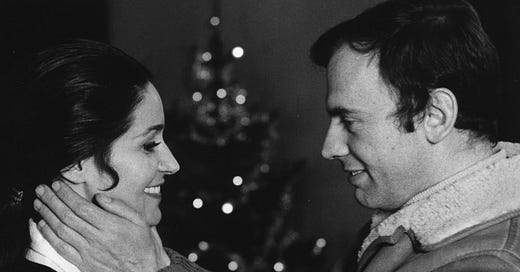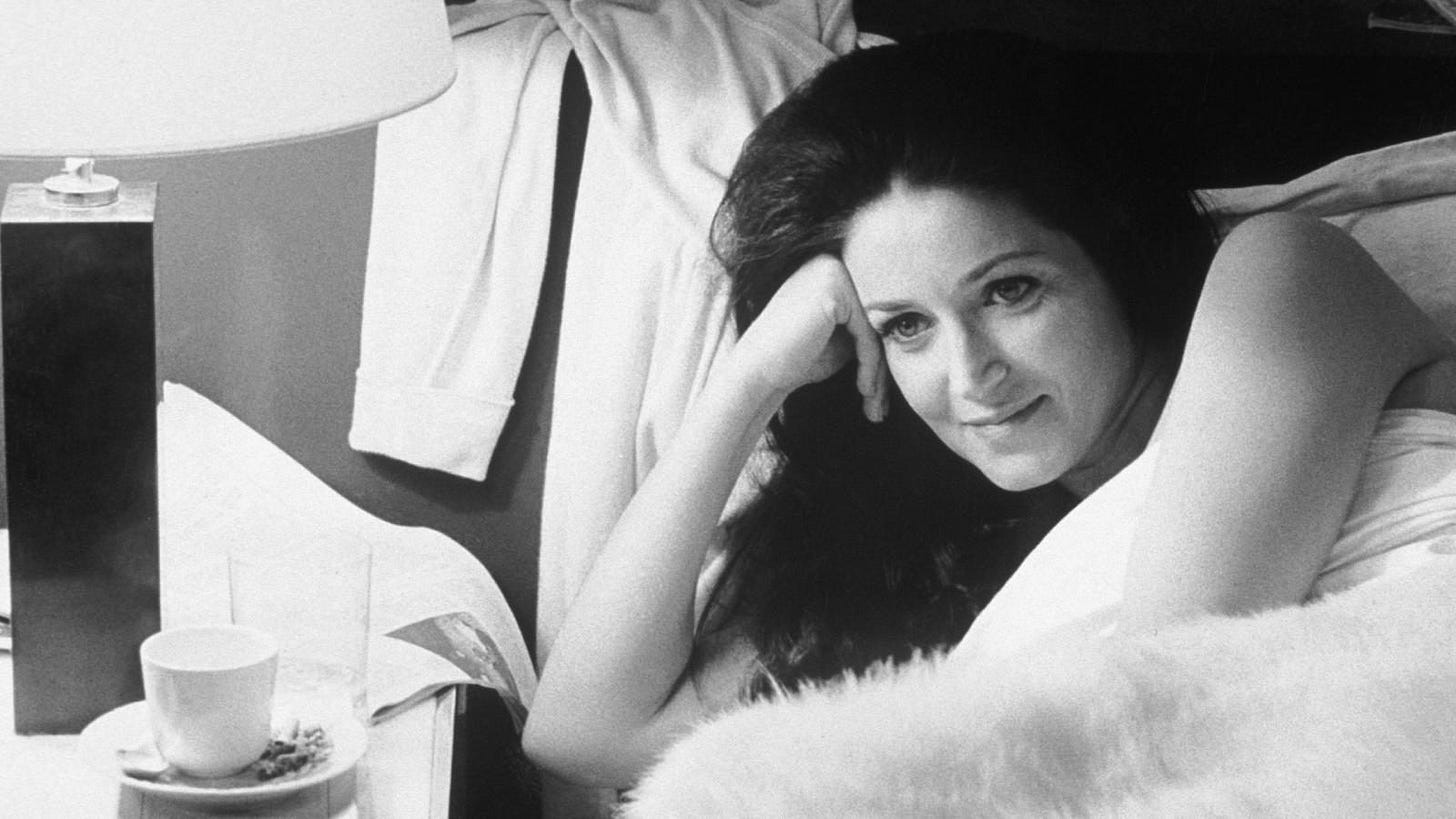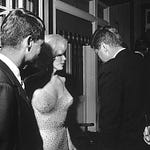Would you give up your principles for love?
Choosing between one and the other may seem like an easy decision in theory. But what if you found yourself in an unexpected situation? What would happen to your principles if an opportunity outside your pre-established rules suddenly presented itself to you?
What would you do if no one was looking? And would your decision mean anything in the greater scheme of things?
The last thing I expected was to find myself grappling with these questions when I kicked back with a glass of wine to watch a movie last night. But that’s exactly what happened. By the time the film ended, I felt challenged by the issues it raised and wondered if the pillars of my self-appraisal might be little more than self-delusion.
‘My Night at Maud’s’
Perhaps, like me, you have heard of this classic film by French New Wave director Éric Rohmer. And maybe it’s been sitting in your Netflix DVD queue for the past few years, often pushed down a few slots for something newer with more buzz.
Surely, you’ll get to the end of Rohmer’s Six Moral Tales eventually. After all, they’ve lasted 50 years. You can wait another few weeks. But for now, there’s this newer shinier thing you can only get on DVD because the gods that govern the streaming universe say so.
And like me, maybe you’re not in the mood to watch French New Wave by the time ‘My Night at Maud’s’ finally makes it to your home.
You’ve got that Disney Plus subscription, Apple TV, and that new series on Hulu. You’ve got Amazon Prime, which just bought all the movies ever made by MGM. And of course, there’s Netflix streaming, the price of which keeps climbing higher into the stratosphere. So high you can almost see an unhinged airline passenger forcibly removing two teeth from the mouth of a flight attendant at 30 thousand feet.
When Thomas Paine said, “These are the times that try men’s souls,” he had no idea a la carte TV would be just as expensive as the cable we keep trying to cut. Or as difficult as freeing ourselves from the umbilical cord that once tied us to Mother England.
But I don’t mind that Netflix makes money when I fail to return a DVD in a timely manner. Because the readiness is all. And last night, I was finally ready for My Night at Maud’s. Or thought I was.
The mathematics of love
In 1965, four years before he completed work on Maud, Rohmer filmed a discussion between two philosophers, which centered on somethng called Pascal’s wager. I’m not qualified to explain it properly. But the gist of it comes down to this: Everyone born must eventually place a bet as to whether God exists.
Because Pascal was a mathematician, he relied on math and probability to weigh the advantages of a bet with “finite outcomes” against one with infinite outcomes. For him, you can’t lose if you stake your life on the infinite.
Never mind that there have been many challenges to Pascal over the years. For Rohmer, the existential issues raised during that documentary were still rattling around in his mind when he began working on My Night at Maud’s. The importance of that wager seemed to resonate with the political climate of the Cold War when nuclear proliferation meant the potential end of civilization and the destruction of Earth.
The movie begins in church. It’s set during the Christmas holidays. Despite the frenzied push to keep our economy from going to hell in a handbasket, Christmas still has meaning embedded in the word itself. It’s the night when Christ was born. That’s why children still put on nativity plays. That’s why you can’t find a place to park at Midnight church services on Christmas Eve. Rohmer wants us to be aware of these things before he gets to the sexy part.
What would you do, really?
What makes the film feel engaging and relevant 52 years later is that Rohmer applied Pascal’s wager to human relationships. And more particularly, to what happens between the sheets. Or on top of them.
One minute you’re a thoughtful engineer like Jean-Louis Trintignant who takes his Catholic religion seriously. You’ve had three or four affairs in your 34 years on the planet, but you’ve only slept with women you’ve had feelings for. Your principles do not include casual sex or one-night stands. You are interested in settling down with someone you could love for the rest of your life.
During the Christmas holidays, you bump into an old school friend you haven’t seen in 14 years. He’s a Marxist philosopher who’s proud of his many one-night stands. The two of you attend a Mozart recital. Afterwards, he invites you to meet his friend Maud played by the seductively beautiful Françoise Fabian, who likes to sleep naked. She’s a divorced doctor whom the Marxist is also in love with.
There will be no spoilers here
You’ve probably figured out that this is a film that asks “will you or won’t you” at some point during the night. But there’s more to it than that. Because in this film, love and sex are couched not only in religious terms but existential ones.
Is a one-night stand always the same as cheap throw-away sex? Or is it an opportunity to connect with another? Who are you if you readjust your principles for the sake of a passionate encounter? Is sainthood worth striving for, or is it a form of madness?
And should you be lucky enough to find lasting love, how far should you go to honor that commitment?
The sick soul of Europe
When New Yorker film critic Pauline Kael referred to “the sick soul of Europe” in her book I Lost It at the Movies, she wasn’t talking about Rohmer. She was talking about Antonioni’s La Notte, Robbe-Grillet’s Last Year at Marienbad, and Fellini’s La Dolce Vita.
I love those films, in part, because they take on the obsessions, projections, confusions, and deceits that often drive the passions we call love. Perhaps because they are “sick” in a way, they have helped me navigate my own journey through love’s winding highway.
They strike me as more honest than the sentimental romantic comedies that feel like casual one-night stands by comparison. I like movies that keep me awake at night. That force me to ask tough questions.
But Pauline Kael didn’t like Rohmer’s work, either. To repeat here what she said about My Night at Maud’s is to give away the story. Something I don’t want to do because knowing what happens is not the same as experiencing it.
My own takeaway from Rohmer’s work is similar to what Joseph Jon Lanthiern wrote in his Slant magazine review. “To experience sexual arousal is to have a spirited argument with one’s self.”
Just the sex, ma’am.
I’ve been seeing articles lately that say sex is just sex. Nothing more. Maybe that’s true. But I’m not so sure.
In his Alexandria Quartet, Lawrence Durrell says “sex is a psychic event.” Whether it’s good sex or bad sex, something important gets said during that particular kind of conversation. Something words cannot express. If you’re lucky, that something may turn out to be love. But maybe that depends on the kind of bet you’ve made — and how much you’re willing to stake on it.
As to the questions raised by My Night at Maud’s, perhaps the best answer comes from Muhammed Ali:
Only the nose knows
Where the nose goes
When the door close.
Because sometimes you only get to know the truth in moments of uncertainty. And I’m not telling.
Would you?
© 2021 Andrew Jazprose Hill
Merry Christmas and Happy Holidays. Thanks for reading/listening.
















Share this post